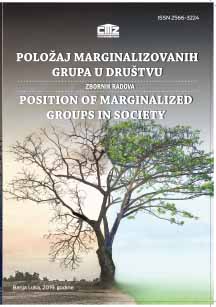MARGINALIZOVANE GRUPE: MEĐUNARODNI STANDARDI I PRAKSA EVROPSKOG SUDA ZA LJUDSKA PRAVA I USTAVNOG SUDA BOSNE I HERCEGOVINE
MARGINALIZED GROUPS: INTERNATIONAL STANDARDS AND CASE-LAW OF THE EUROPEAN COURT OF HUMAN RIGHTS AND THE CONSTITUTIONAL COURT OF BOSNIA AND HERZEGOVINA
Author(s): Miodrag N. Simović, Marina SimovićSubject(s): Gender Studies, Law, Constitution, Jurisprudence, Human Rights and Humanitarian Law, EU-Legislation
Published by: CENTAR MODERNIH ZNANJA
Keywords: homosexual groups; children; women; persons with disabilities; persons with mental disabilities
Summary/Abstract: Building an inclusive society, in which the difference is respected and appreciated, and which actively combats discrimination and prejudice, implies the empowerment of marginalized groups and individuals. On the other hand, these groups are often excluded from decision making, public institutions, basic services, and even citizenship. They are more vulnerable to poverty, are more likely to be affected by life-threatening illnesses, and are more often victims of violence and exploitation. Anti-marginalization can be fought against by: building inclusive institutions, supporting anti-discrimination legislation, affirmation of respect for human rights, strengthening of equality measures, supporting the idea of empowerment and responsibility through targeted policies and programs and by capacity building of civil society organizations.When it comes to Bosnia and Herzegovina, the rights of marginalized groups, primarily sexual and gender minorities, are impossible to be analyzed without the context of the state in which they were (the former Yugoslavia) and the environment in which it currently is, and the events it has been through and the influence from outside. They have inevitably affected the creation, the violation, the struggle or the achievement of rights of marginalized groups. However, the first steps have already been made: discrimination based on sexual orientation and gender identity is prohibited by law; special procedures have been introduced and a clearly defined role of the institution of Human Rights Ombudsman of BiH, etc. The fight for human rights of marginalized persons in Bosnia and Herzegovina goes in the direction of consistent application of existing anti-discrimination regulations, education of judges, prosecutors and policemen, work with community in relation to education on rights and freedoms, and mechanisms of protection and work with society, aimed at removing homophobia and transphobia.The paper presents relevant international standards referring to marginalized groups, with corresponding case-law of the European Court of Human Rights and the Constitutional Court of Bosnia and Herzegovina. Within such approach, authors advocate for the rule of law, which (also) in this case implies clear and unambiguous norms, based on international regulations.
Journal: DRUŠTVENE DEVIJACIJE
- Issue Year: IV/2019
- Issue No: 4
- Page Range: 33-59
- Page Count: 27
- Language: Serbian

